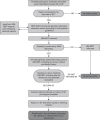"Not pathogenic until proven otherwise": perspectives of UK clinical genomics professionals toward secondary findings in context of a Genomic Medicine Multidisciplinary Team and the 100,000 Genomes Project
- PMID: 29261176
- PMCID: PMC5880578
- DOI: 10.1038/gim.2017.157
"Not pathogenic until proven otherwise": perspectives of UK clinical genomics professionals toward secondary findings in context of a Genomic Medicine Multidisciplinary Team and the 100,000 Genomes Project
Abstract
PurposeApproaches to secondary findings in genome sequencing (GS) are unresolved. In the United Kingdom, GS is now routinely available through the 100,000 Genomes Project, which offers participants feedback of limited secondary findings.MethodsIn Oxford, a Genomic Medicine Multidisciplinary Team (GM-MDT) governs local access to GS, and reviews findings. Semistructured interviews were conducted with 19 GM-MDT members to explore perspectives on secondary findings.ResultsWhile enthusiastic about GS for diagnosing rare disease, members question the rationale for genome screening largely because of lack of evidence for clinical utility and limited justification for use of resources. Members' views are drawn from diverse experiences; they feel a strong sense of responsibility to act in participants' best interests. The capacity to return limited secondary findings should be enabled, but members favor a cautious approach that is responsive to accumulating evidence. Informed participant choice is considered critical, yet challenging. Discrimination of variants is considered essential, and requiring of specialist input and consensus. Multiple areas requiring enhanced engagement and education are identified, i.e., for patients, the public, and health-care professionals; at present, mainstreaming of genomics may be premature.ConclusionUK experts believe that evidence to inform policy toward secondary findings is lacking, arguing for caution.
Conflict of interest statement
The authors declare no conflict of interest.
Figures
References
Publication types
MeSH terms
Grants and funding
LinkOut - more resources
Full Text Sources
Other Literature Sources


